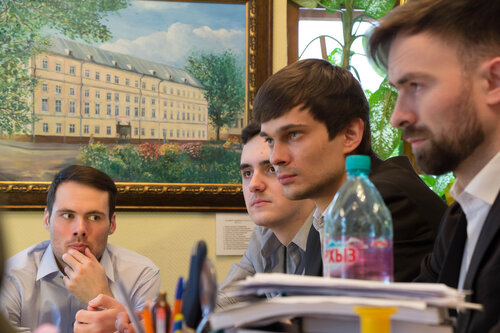+ Grade 3, Unit 4.
Theatre. Cinema. Television. RadioTheatre
Theatre is one of the oldest kinds of
arts. People used to come to the theatre to see
tragedies,
comedies,
ballets and to listen to
operas.
Cinema, television and
radio came into our life much later. They
brought the world into our homes. However, they didn't
move theatre
away from our life. Theatre can't be substituted by any of them.
There are many theatres and
theatre goers in Moscow. The most popular theatres are the Bolshoi theatre, the Maliy theatre, the MHAT, the Tabakov, the Puppet theatres and many others. The most
famous of them is the Bolshoi theatre.
"Have you ever been to the Bolshoi theatre?"
"Oh, yes! I have. I've been there three times."
"We
had our seats in the stalls, another time
in the balcony and the latest time in
the dress circle."
"What did you see?"
"We saw
the Swan Lake, then we listened to "Rigoletto".
"And what was it the latest time?"
"Well... I remember we were sitting in the dress circle... We were discussing the performance... Oh, yes! It was BizetвАЩs Carmen". We
enjoyed all the
performances."
"You said you had enjoyed all the performances. Did you really?"
"Oh, yes, I did!"
–У—А–∞–Љ–Љ–∞—В–Є–Ї–∞. –Я—А–µ–і–ї–∞–≥–∞—О Past Simple, Past Continuous and Past Perfect. –°–Љ. –≤ —В–µ–Ї—Б—В–µ. –Р —В–∞–Ї–ґ–µ –љ–µ–њ—А–∞–≤–Є–ї—М–љ—Л–µ –≥–ї–∞–≥–Њ–ї—Л. II. Grammar. Pronunciation
Past Simple. Past Continuous. Past Perfect.
Past Simple (–њ—А–Њ—Б—В–Њ–µ –њ—А–Њ—И–µ–і—И–µ–µ) –Є—Б–њ–Њ–ї—М–Ј—Г–µ—В—Б—П –і–ї—П –Њ–±–Њ–Ј–љ–∞—З–µ–љ–Є—П –і–µ–є—Б—В–≤–Є—П, –Ї–Њ—В–Њ—А–Њ–µ –њ—А–Њ–Є–Ј–Њ—И–ї–Њ –≤ –Њ–њ—А–µ–і–µ–ї–µ–љ–љ–Њ–µ –≤—А–µ–Љ—П –≤ –њ—А–Њ—И–ї–Њ–Љ –Є –≤—А–µ–Љ—П –Ї–Њ—В–Њ—А–Њ–≥–Њ –Є—Б—В–µ–Ї–ї–Њ (–њ—А–Њ–Є–Ј–Њ—И–ї–Њ –Є –Ј–∞–Ї–Њ–љ—З–Є–ї–Њ—Б—М).
I did my homework yesterday вАУ –Т—З–µ—А–∞ —П —Б–і–µ–ї–∞–ї –і–Њ–Љ–∞—И–љ–µ–µ –Ј–∞–і–∞–љ–Є–µ–°–ї–Њ–≤–∞ вАУ —Г–Ї–∞–Ј–∞—В–µ–ї–Є: yesterday, two days ago, a long time ago, last week (month, year), in 1980.
Past Continuous (–њ—А–Њ—И–µ–і—И–µ–µ –і–ї–Є—В–µ–ї—М–љ–Њ–µ)–Є—Б–њ–Њ–ї—М–Ј—Г–µ—В—Б—П –і–ї—П –Њ–±–Њ–Ј–љ–∞—З–µ–љ–Є—П –і–µ–є—Б—В–≤–Є—П, –Ї–Њ—В–Њ—А–Њ–µ –њ—А–Њ–Є—Б—Е–Њ–і–Є–ї–Њ –≤ –Њ–њ—А–µ–і–µ–ї–µ–љ–љ–Њ–µ –≤—А–µ–Љ—П –≤ –њ—А–Њ—И–ї–Њ–Љ.
I was doing my homework when you called me yesterday. вАУ –ѓ –і–µ–ї–∞–ї –і–Њ–Љ–∞—И–љ–µ–µ –Ј–∞–і–∞–љ–Є–µ, –Ї–Њ–≥–і–∞ —В—Л –њ–Њ–Ј–≤–Њ–љ–Є–ї –Љ–љ–µ –≤—З–µ—А–∞.
–°–ї–Њ–≤–∞ вАУ —Г–Ї–∞–Ј–∞—В–µ–ї–Є: yesterday at 7 a.m., yesterday night, when you called me, вА¶
Past Perfect (–њ—А–Њ—И–µ–і—И–µ–µ —Б–Њ–≤–µ—А—И–µ–љ–љ–Њ–µ) –Є—Б–њ–Њ–ї—М–Ј—Г–µ—В—Б—П –і–ї—П –Њ–±–Њ–Ј–љ–∞—З–µ–љ–Є—П –і–µ–є—Б—В–≤–Є—П, –Ї–Њ—В–Њ—А–Њ–µ –Ј–∞–≤–µ—А—И–Є–ї–Њ—Б—М –і–Њ –Њ–њ—А–µ–і–µ–ї–µ–љ–љ–Њ–≥–Њ –Љ–Њ–Љ–µ–љ—В–∞ –≤ –њ—А–Њ—И–ї–Њ–Љ. –£–њ–Њ—В—А–µ–±–ї—П–µ—В—Б—П —В–∞–Ї–ґ–µ –і–ї—П —Б–Њ–≥–ї–∞—Б–Њ–≤–∞–љ–Є—П –≤—А–µ–Љ—С–љ.
Boris said, he had already done his homework. - –С–Њ—А–Є—Б —Б–Ї–∞–Ј–∞–ї, —З—В–Њ —Г–ґ–µ —Б–і–µ–ї–∞–ї –і–Њ–Љ–∞—И–љ–µ–µ –Ј–∞–і–∞–љ–Є–µ.
Regular and Irregular Verbs
–Т –∞–љ–≥–ї–Є–є—Б–Ї–Њ–Љ —П–Ј—Л–Ї–µ —Б—Г—Й–µ—Б—В–≤—Г–µ—В –і–≤–∞ –≤–Є–і–∞ –≥–ї–∞–≥–Њ–ї–Њ–≤: –њ—А–∞–≤–Є–ї—М–љ—Л–µ –Є –љ–µ–њ—А–∞–≤–Є–ї—М–љ—Л–µ. –Я—А–∞–≤–Є–ї—М–љ—Л–µ –≥–ї–∞–≥–Њ–ї—Л –≤ Past Simple –Є Past Perfect –њ—А–Є–љ–Є–Љ–∞—О—В –Њ–Ї–Њ–љ—З–∞–љ–Є–µ -ed. –Э–∞ –љ–µ–њ—А–∞–≤–Є–ї—М–љ—Л–µ –≥–ї–∞–≥–Њ–ї—Л —Н—В–Њ –њ—А–∞–≤–Є–ї–Њ –љ–µ —А–∞—Б–њ—А–Њ—Б—В—А–∞–љ—П–µ—В—Б—П, –Є—Е —Д–Њ—А–Љ—Л –љ–µ–Њ–±—Е–Њ–і–Є–Љ–Њ –≤—Л—Г—З–Є—В—М –љ–∞–Є–Ј—Г—Б—В—М.
III. Reading. Writing. Free Speech
+
1. Cinema
Cinema came into our life at the beginning of the XX century and like theatre brought tragedies, comedies, operas and ballets into it.
Going to the cinema has always been a happy part of our life. Some people go to the cinema when they want to see a super new film which is much talked about. Other people go to the cinema when they want to have a change.
+
2. Radio and Its Advantages
Radio is one of the most wonderful discoveries made by human beings. It came into our life in the 19th century. Priority in the invention of radio belongs to the Russian scientist Popov.
One of the advantages of the radio is that it can be enjoyed anywhere: at home, in the office, and while driving a car. The biggest advantage is the following: you can listen to it while doing other activities like household(s) tasks or driving.
However, there is one obvious disadvantage: the information is not supported by pictures. Remember, a picture is worth a thousand words.
There are many radio stations, and people have their favourite ones. They listen to them regularly. Some radio programs are especially interesting for the young. The success of the programs depends very much on the personality of the talk show host. Sometimes radio listeners send emails (or even write letters) to the radio-studios and express their viewpoints.
3. Television
When television came into our life, some of us decided we didn't need theatre any more. Sitting at home in an arm-chair you can enjoy a performance in the Bolshoi theatre, a film produced a hundred years ago and a modern talk show. In fact, television brought the world into our homes.
My Dad likes to watch comedies and musicals. He never watches tragedies and horrors. He says there are too many of them in real life to see them on the screen.
4. Modern Technologies in My Family
My Grandpa is fond of radio and listens to it from early in the morning till late at night. He says that he is always in need of information.
My Dad is a computer lover. He started to deal with the computer in his early childhood and he has been using it since that time.
My Grandma enjoys television. Someone told her in the XX century that it had brought the world into our homes and she still believes it. She watches television between meals and during meals, between numerous telephone calls and stops watching it only when I start doing my homework. She is sure she must always help me because I am not ready for the complicated modern life.
5.My Mom is a Theatre Goer
My Mom is a theatre goer. She knows all the theatres in Moscow: from the Bolshoi theatre to the new one in the basement of our house. She watches everything - tragedies, comedies, ballets, musicals and operettas. Furthermore, she listens to operas and knows the names of many composers. She likes to have her seats in the stalls. In case there are no tickets for the stalls, she buys tickets for the dress circle, box and the balcony.





